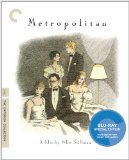| Reviews & Columns |
|
Reviews DVD TV on DVD Blu-ray 4K UHD International DVDs In Theaters Reviews by Studio Video Games Features Collector Series DVDs Easter Egg Database Interviews DVD Talk Radio Feature Articles Columns Anime Talk DVD Savant Horror DVDs The M.O.D. Squad Art House HD Talk Silent DVD
|
DVD Talk Forum |
|
|
| Resources |
|
DVD Price Search Customer Service #'s RCE Info Links |
|
Columns
|
|
|
Metropolitan: The Criterion Collection
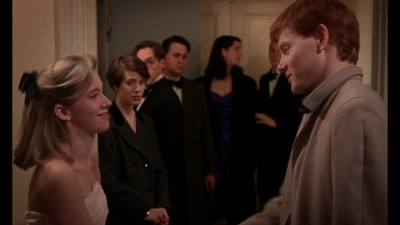
Please Note: The images used here are taken from the 2006 Criterion DVD edition, not the Blu-ray edition under review.
Whit Stillman (Damsels in Distress) is a magical filmmaker, and a challenging one, too, though in few of the ways that word might usually apply. He presents viewers (or at least, speaking for myself, a viewer like me) with the challenge of stories devoted to worlds and characters that might seem outmoded, uninteresting, even obnoxiously overprivileged; his generally upper-middle-class to flat-out old-money-stinking-rich, post-college East Coast gadabouts and careerists would generally be a bit too close to the insular 1% for my taste, more aptly done justice to by a satire like American Psycho. But that's where the magic comes in: realistically or not, Stillman makes his characters and their little worlds fully aware of their own contradictions, the tenuousness and perhaps ridiculousness of their artificially elevated socioeconomic positions, and life becomes something like an ongoing, self-examining (and not nearly as self-regarding as one might assume, and when it is, it's played for laughs) internal debate about values, aspirations, the differences between good and bad behavior and taste -- and it's delightfully funny, charming, literate, often surprisingly melancholy, without ever descending into self-pity or false, self-indulgent nostalgia. This very particular, precise, exquisitely gentle sensibility is already fully developed in Stillman's debut film, 1989's Metropolitan, which takes place, as a title card lettered in a simple, tasteful font informs us, in "Manhattan -- Christmas vacation -- Not long ago" (one can infer that it's the mid-'70s, but that's not terribly important; one of the film's many achievements is its seemingly effortless timelessness) and follows the fortunes, flings, obsessions, and fallings in love of a group of young-adult boys and girls in Manhattan's dwindling capital-s Society.
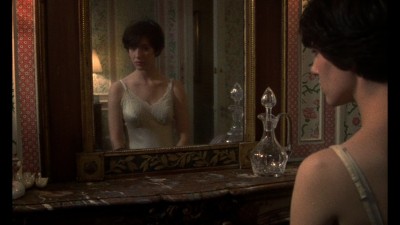
Metropolitan's central character, red-headed Tom Townsend (Edward Clements), is actually a bit of an intruder, a stranger and unknown quantity who gets the ball rolling on the tuxedo-owning crowd's musing self-interrogation. Tom, who lives with his mother on Manhattan's lower-rent West Side on "limited resources" after his father has left them several years prior, falls in with a group of begowned debs (young girls) and tuxedoed escorts (young men) who call themselves the "Sally Fowler Rat Pack" after their frequent hostess (Dylan Hundley). This is on the insistence of Nick Smith (Chris Eigeman), who, one night during a season of evening Christmas celebrations, fears that hapless pedestrian Tom meant to get the cab his group has snagged, and, overcome with generous holiday spirit, insists that Tom share said cab and come over for one of his group's frequent after-dinner/dancing get-togethers at one of their families' Park Avenue-vicinity apartments. It turns out that Tom has been on the periphery of this group of society kids for a while; in their (presumably Ivy-League, Seven Sisters, or otherwise very exclusively private) college days, he had a mad, letter-writing romance with upper-crust girl Serena Slocum (Elizabeth Thompson), and still carries a torch for her, though Serena's college friend Audrey Rouget (Carolyn Farina), an integral member of this little band of late-night conversationalists that Tom has now been invited to join, has in her turn had Tom's impassioned letters revealed to her by the mercurial Serena, and has consequently been nursing an unrequited crush on him for nearly as long as he's been holding onto his for Serena.
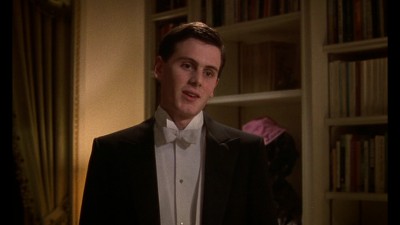
This minefield of romantic misunderstanding and the awkwardness it causes motivates the group's contentious feelings toward Tom and develops into a sort-of Tom-Audrey-Serena love triangle in which the indecisive Tom is ultimately called to (he thinks) save the honor of Audrey; this all provides the plot mechanism. But Metropolitan is far from a "plot" film; the story points are there as a pretext to develop the characters, not the other way around, and thus by far the majority of screen time is devoted to dialogue, the words of these young people trying on stances and personae as they attempt to find themselves. Tom is opposed in principle to the world he's accidentally slipped into, describing himself as an adherent to the higher-minded ideals of the 19th-century communal experiment Brook Farm and the socialist theories of Charles Fourier (which leads to one of the film's funniest lines, a chipper "Good luck with your furrierism [sic]!" from one of the debs after Tom's first night as a participant). Earnest, nebbishy Charlie (Taylor Nichols) -- who, before they later become fast friends, dislikes Tom for the ease with which he's won the affections of Audrey, whom Charlie is in love with -- theorizes on everything from Bunuel's The Discreet Charm of the Bourgeoisie (so disappointing to him, since he sincerely believes the bourgeoisie really does have a discreet charm) to the inevitable failure and doom of their floundering social class, which he dubs "UHB" ("Urban Haute Bourgeoisie"). And the flippant, righteous, gold-hearted Nick, probably the film's overall best-known, most beloved and immediately appealing character, is always on hand with a non-sequitur, an extravagantly roundabout way to make a point, or to suggest that "UHB," rather than being said letter by letter as an acronym, should be pronounced phonetically (rhyming with "rub") to gain its full effect and really catch on. Tom and Audrey's conversations (he's dismissive of Jane Austen based on the literary criticism he prefers to read to the absolute exclusion of the novels themselves, while Audrey is a smart, half-saucy, half-moralistic Jane Austen girl if there ever was one) are, content-wise, the typical speech of recent college grads. But in motivation and delivery, they're blushing, halting expressions of romantic interest, beautifully played by Clements and Farina with just the right amount of self-consciousness to render them equally humorous and tender.
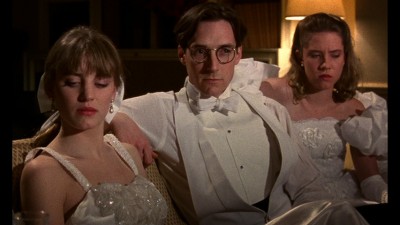
Visually, musically, and montage-wise, Stillman stakes out a very precise but unpressured, relaxed patch of stylistic ground that, while it certainly has elements of Woody Allen pathos and deeper-than-expected Ernst Lubitsch fizz in it, becomes as the film progresses its own elegantly simple dramatic and visual texture, one that perfectly accommodates the conversational focus of the performances while providing an unelaborate but perfectly poised visual complement. Camera movement is scarce except for the medium-long tracking for walk-and-talk exteriors; the editing, by Christopher Tellefson, is as supple as it is unobtrusive (editing is the only way to make these still interiors move, and he does it very well: nothing flashy, just a cut from at the perfect moment in the enthrallingly funny, sweet, absurd conversations); and the look of the film is nighttime, lamp-lighted, interior-heavy, something like the warmly lit autumn/winter Manhattan visual tone of Woody Allen's color films with their somehow rich browns and greys and their subdued yet specific set designs, but without Allen's final coat of burnish and with a more observational, quasi-documentary, snapshot-of-a-time-and-place feel lent by cinematographer John Thomas's brilliantly executed 16 mm cinematography, which employs the limitations of the film's audaciously low budget entirely to its advantage. (In addition to all the enjoyable things it has to offer, Metropolitan could work as a living bible for the low-budget creation of an entire world on film.) The vital cherry on top of Stillman's smart, bittersweet confection is the music by Marc Suozzo and Tom Judson, which adds an almost but not quite campy air with its rococo jazz/rhumba/cha-cha melodies, rhythms, and instrumentations, with interpretations of classical pieces interspersed to hit the deeper, more mournful notes as sparingly called for. The film is decidedly of the ambitious but un-showy sort that lives or dies by nuance, subtlety, and detail, and at every level, Stillman proves himself a master of all of these.
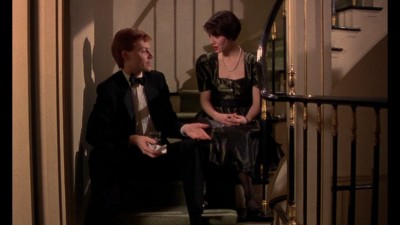
Later on in the decade of Metropolitan's release, the vicissitudes of public taste and distributors' preferences during the rise of "independent film" began, stereotypically speaking, to seem like something that lent itself most easily to underground-only luridness and "tough" subject matter. But before all that, this tiny picture, made in a truly independent way -- on the shortest of shoestrings, by the skin of the cast and crew's teeth and with a lot of labor-of-love energy and rapid-flowing creative inspiration on board -- marked out "independent film" as less a genre than the preferred and/or necessitated venue for those who want to show the lives of their characters, their ways of interacting, and their worlds with an undiluted intelligence, particularity, and assertion of individual voice (whether that voice is unusually hard-hitting or, like Stillman's, extraordinarily literate, delicate, and sensitive). The film is a quiet, unassuming triumph, something so charming and amusing that just how remarkable it is, its true grace and beauty, really only reveals itself after multiple viewings, once the first impression of it as a very funny, "small," low-budget, dialogue-heavy comedy has been made. Its humor remains vibrant and refreshing, of course, but its multiple, marvelously accomplished attributes -- its finely-honed technical and performative qualities, its distinct and rare generosity, its imaginative expressions of newly-entered postadolescent storms of love and longing, and its crystallization of the adorable, hilarious, sad faltering of youth in search of themselves -- become clearer and clearer the more well-acquainted you get with it, and it's a film whose characters, situations, quips, and open, guileless style have a very special way of welcoming you in when it comes to first making their acquaintance, and of drawing you back to deepen it over many subsequent viewings.
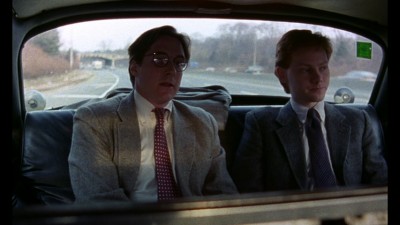
THE BLU-RAY DISC:
A lovely AVC/MPEG-4, 1080p transfer at the 1.66:1 aspect ratio highlights the captivating, snapshot-like super-16 mm cinematography of John Thomas; the extra, natural grain resulting from this unusual format (for a narrative feature) is fully present and beautiful, a real filmic experience on your home screen unsullied by overdoing the digital noise reduction, with every bit of warm, immediate, brownish-dark and grey Manhattan exterior and interior tone and glowing light fully present and accounted for in all their slightly-aged-documentary-looking glory.
Sound:Like the film's 16 mm visual format, its monaural soundtrack fruitfully borrows a page from Woody Allen's sonic playbook (Allen having made his films monaurally long after the advent of Dolby and DTS, until the mechanism was literally no longer available) for a fitting, slightly anachronistic feel, and is presented here as a PCM track that renders the sound every bit as compact, clear, and intimate as it was meant to be.
Extras:All of the supplements from Criterion's 2005 DVD release of Metropolitan have been carried over to the new Blu-ray edition, including:
--A feature-length audio commentary with Stillman, actors Taylor Nichols and Chris Eigeman, and editor Christopher Tellefsen. It's a revealing track all around, both personally (Nichols remembers not knowing most of the intellectual/literary references his character so freely uses, for example), and technically/professionally, with Stillman and everyone offering a million insights into the dramaturgy, the performance, and of course the hardscrabble, often trying adventure of making something like Metropolitan, with its well-off milieu, under such insanely low-budget (and often, to hear them tell it, improvisatory, guerrilla, and shot-stealing) circumstances. (Stillman is also present for optional commentary on deleted scenes.)
--Ten minutes or so of outtakes featuring plenty more (improvised?) banter among the characters, a number of "cut!"s brought on by flubs and helpless laughter from the cast, and a general sense of real low-budget, skin-of-their-teeth camaraderie. (Also included is a brief, separate selection of outtakes comprising a tribute to line producer Brian Greenbaum, who died at age 30 in 1992.)
--A section devoted to alternate casting, including a scene with Toxic Avenger director Lloyd Kaufman playing the walk-on role of sleazy record producer filled by John Lynch in the completed film, and one with Will Kempe, who ultimately played the film's titled-aristocrat jerk/villain Rick von Sloneker) in the role of Nick Smith, played ultimately by Chris Eigeman.
--The film's original theatrical trailer.
--An insert featuring an essay by Luc Sante (which, I'll just own up to it, I'd read and loved upon the original DVD release and avoided rereading in preparation for this review, as it's undoubtedly a finer observation and appreciation of Stillman's wonderful film) and, it should be noted, a glorious, Edward Gorey-reminiscent pencil drawing by Pierre Le Tan for the cover art, which exactly captures the feel and tone of the film and would be perfect were Metropolitan ever to be remade in animated form.
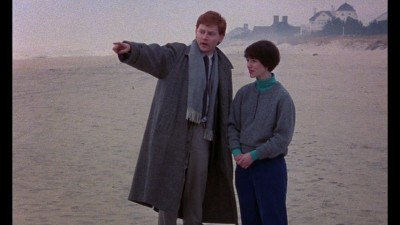
Whit Stillman's distinctive, very auspicious debut may concern itself with what can only be called an elite set of youth, but neither it nor its characters is elitist, and that makes all the difference: These kids have different trappings and clothes than their public-school counterparts, and perhaps some of their superficial reference points are different than most people's, but their concerns with finding themselves, figuring out their values, and falling in love become our concerns, too, thanks to Stillman's sparkling, witty, often riotously funny dialogue and assured, classically-derived filmmaking style, along with an inspiring set of self-consciously verbose performances by the young cast. There is a unique lightness, even a whimsy, at work throughout as our stuck-between-classes intermediary, Tom Townsend, who occupies a sort of limbo between the rest of us and wealthy society, is pulled and welcomed into the film's seemingly cozy but actually fraught world of debutante dances and quip-filled conversation. But Metropolitan's sparkling tone, its tastefully elegant sets and all the wit and banter that occasion very frequent laughter, is only part of the recipe; it contains, along with its overflowing light-touch charm, a surprising amount of concurrent, really moving pathos, with Stillman expertly blending into the film's observations of their harmless pretentions and foibles his simple, direct affection for and recognition of these characters, who, behind their tuxedoes, gowns, idioms, and unusual (perhaps unmerited) material ease, do undeniably have their share of troubles and feelings, too. However "metropolitan" they might be, Tom and Charlie and Nick and Audrey and (most of) the others become as human and dear to us as they are to Stillman as we follow along, transfixed and delighted, with their vacillating overcaution and recklessness, their extravagance and primness, as they brave the perils and pursue the pleasures of rites of passage that, idiosyncratic as the form they take on the Upper East Side might be, will still be easily recognizable and compelling to anyone who's ever been twentysomething and looking to find out who they are and where they belong. Highly Recommended.
|
| Popular Reviews |
| Sponsored Links |
|
|
| Sponsored Links |
|
|
| Release List | Reviews | Shop | Newsletter | Forum | DVD Giveaways | Blu-Ray | Advertise |
|
Copyright 2024 DVDTalk.com All Rights Reserved. Legal Info, Privacy Policy, Terms of Use,
Manage Preferences,
Your Privacy Choices | |||||||









